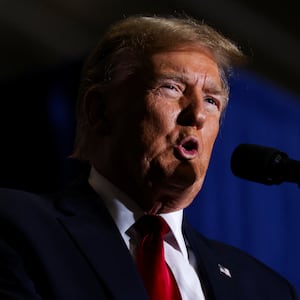Donald Trump and his top lieutenants on Monday appealed every part of a New York judge’s $464 million bank fraud judgment—a sign that the real estate tycoon will try to secure nearly half a billion dollars to prolong the legal fight.
New York Attorney General Letitia James has already indicated she will attempt to seize Trump’s assets soon with the bank fraud trial judge’s permission. The new appeal won’t stop that process unless Trump quickly comes up with the money to hit pause on the judgment, money that the state requires up front.
“He needs to pay the bond to get a stay pending appeal. He needs it to stay the execution of the judgment. The clock keeps running until he pays,” said Neil Pedersen, who runs an appellate bond agency in Manhattan.
Lawyers for the Trump family and their associates have asked New York’s First Judicial Department to review whether a state judge “committed errors of law and/or fact, abused its discretion, and/or acted in excess of its jurisdiction” by decimating the former president’s vast wealth and yanking the Trump Organization from their control.
An 11-week trial in Lower Manhattan ended when New York Supreme Court Justice Arthur F. Engoron issued his searing, 92-page order on Feb. 16, ripping into the Trumps for lying to banks about real estate assets. The order held the former president personally responsible for the long-running fraud and presented the billionaire with the worst personal financial crisis of his life—just as he balances four upcoming criminal trials and an ongoing 2024 presidential campaign.
But appealing the gargantuan judgment, which started at $364 million but in reality adds up to more than $464 million due to mounting interest that goes back several years, requires Trump to front the money now. Although Trump last year gloated under oath that he has liquid assets amounting to some $400 million in cash, that alone wouldn’t be enough to cover the cost of appealing the bank fraud judgment while also fighting off a recent $83 million rape defamation trial jury verdict in federal court.
The court filing that appeared in the case’s docket did not state how Trump is managing to source the funds—whether he emptied his own bank accounts or found a willing lender outside New York to front the money for him.
Court documents filed in New York state court Monday morning show that the Trumps’ lawyers seek to reverse what they deemed Engoron’s “far-reaching, punitive” order. They want a higher court to overturn Engoron’s decision to yank Don Jr. and Eric Trump, the billionaire’s two sons currently running the company, from their positions of leadership there. They also want to stop Engoron from empowering Barbara Jones, a former federal judge who has been babysitting the company for the past year as an independent monitor, with enhanced authority that would essentially make her the top decision maker at the family company.
This appeal poses thorny questions for the Trumps, because the judge’s order prohibits the Trump Organization from applying for loans at any financial institutions overseen by the state’s Department of Financial Services—in effect choking them off from the financial capital of the world and simultaneously frustrating their ability to secure funds to engage in this prolonged legal battle.
In the 10 days since the ruling, Trump has been seething about the threat to his riches. He immediately complained about it on his Truth Social media network. But he has since directed his followers to conservative commentary about the supposed “mob rule” unfairness of the trial and a news story about the threat of truckers targeting the “Trump-hating judge.”







